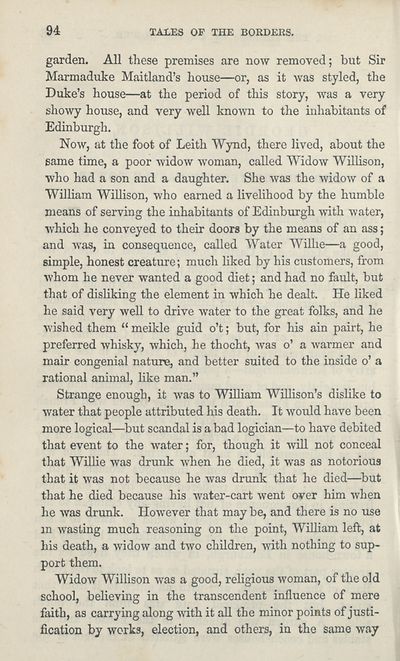Download files
Complete book:
Individual page:
Thumbnail gallery: Grid view | List view

94
TALES OF THE BORDERS.
garden. All these premises are now removed; but Sir
Marmaduke Maitland’s house—or, as it was styled, the
Duke’s house—at the period of this story, was a very
showy house, and very well known to the inhabitants of
Edinburgh.
Now, at the foot of Leith Wynd, there lived, about the
same time, a poor widow woman, called Widow Willison,
who had a son and a daughter. She was the widow of a
William Willison, who earned a livelihood by the humble
means of serving the inhabitants of Edinburgh with water,
which he conveyed to their doors by the means of an ass;
and was, in consequence, called Water Willie—a good,
simple, honest creature; much liked by his customers, from
whom he never wanted a good diet; and had no fault, but
that of disliking the element in which he dealt. He liked
he said very well to drive water to the great folks, and he
wished them “ meikle guid o’t; but, for his ain pairt, he
preferred whisky, which, he thocht, was o’ a warmer and
mair congenial nature, and better suited to the inside o’ a
rational animal, like man.”
Strange enough, it was to William Willison’s dislike to
water that people attributed his death. It would have been
more logical—but scandal is a bad logician—to have debited
that event to the wrater; for, though it will not conceal
that Willie was drunk when he died, it was as notorious
that it was not because he was drunk that he died—but
that he died because his water-cart went over him when
he was drunk. However that may be, and there is no use
in wasting much reasoning on the point, William left, at
his death, a widow and two children, with nothing to sup¬
port them.
Widow Willison was a good, religious woman, of the old
school, believing in the transcendent influence of mere
faith, as carrying along with it all the minor points of justi¬
fication by works, election, and others, in the same way
TALES OF THE BORDERS.
garden. All these premises are now removed; but Sir
Marmaduke Maitland’s house—or, as it was styled, the
Duke’s house—at the period of this story, was a very
showy house, and very well known to the inhabitants of
Edinburgh.
Now, at the foot of Leith Wynd, there lived, about the
same time, a poor widow woman, called Widow Willison,
who had a son and a daughter. She was the widow of a
William Willison, who earned a livelihood by the humble
means of serving the inhabitants of Edinburgh with water,
which he conveyed to their doors by the means of an ass;
and was, in consequence, called Water Willie—a good,
simple, honest creature; much liked by his customers, from
whom he never wanted a good diet; and had no fault, but
that of disliking the element in which he dealt. He liked
he said very well to drive water to the great folks, and he
wished them “ meikle guid o’t; but, for his ain pairt, he
preferred whisky, which, he thocht, was o’ a warmer and
mair congenial nature, and better suited to the inside o’ a
rational animal, like man.”
Strange enough, it was to William Willison’s dislike to
water that people attributed his death. It would have been
more logical—but scandal is a bad logician—to have debited
that event to the wrater; for, though it will not conceal
that Willie was drunk when he died, it was as notorious
that it was not because he was drunk that he died—but
that he died because his water-cart went over him when
he was drunk. However that may be, and there is no use
in wasting much reasoning on the point, William left, at
his death, a widow and two children, with nothing to sup¬
port them.
Widow Willison was a good, religious woman, of the old
school, believing in the transcendent influence of mere
faith, as carrying along with it all the minor points of justi¬
fication by works, election, and others, in the same way
Set display mode to:
![]() Universal Viewer |
Universal Viewer | ![]() Mirador |
Large image | Transcription
Mirador |
Large image | Transcription
| Antiquarian books of Scotland > Scotland/Scots > Wilson's tales of the Borders and of Scotland > Volume 3 > (390) |
|---|
| Permanent URL | https://digital.nls.uk/109233643 |
|---|
| Description | Thousands of printed books from the Antiquarian Books of Scotland collection which dates from 1641 to the 1980s. The collection consists of 14,800 books which were published in Scotland or have a Scottish connection, e.g. through the author, printer or owner. Subjects covered include sport, education, diseases, adventure, occupations, Jacobites, politics and religion. Among the 29 languages represented are English, Gaelic, Italian, French, Russian and Swedish. |
|---|

